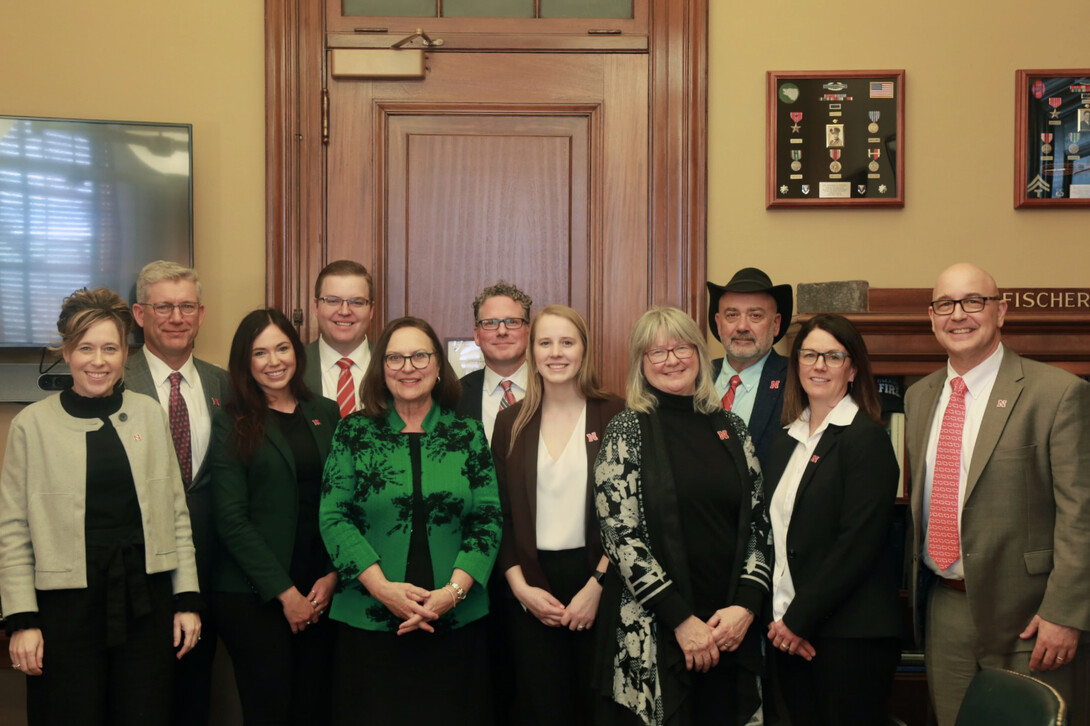
Lincoln, Neb. —Each year the University of Nebraska–Lincoln’s Institute of Agriculture and Natural Resources appoints delegates to meet with elected officials in Washington, D.C. and discuss initiatives that impact the university’s role as one of the nation’s leading land-grant universities. This year six delegates from the national Council for Agricultural Research, Extension, and Teaching (CARET) accompanied IANR leadership to Washington D.C., to meet with lawmakers invested in Nebraska’s.
“Sometimes, as end-users, we might not be familiar with putting the pieces together and knowing how research or Extension impacts ‘me,’” said Amber Burge, CARET delegate and marketing officer at Flatwater Bank in Gothenburg. “There is cutting-edge research at IANR to improve genetics and feed efficiency, and reduce our environmental footprint. The ability of our elected officials to hear directly from us as end-users really helps connect the dots.”
Founded in 1982 by the Association of Public Land-grant Universities (APLU), CARET aims to boost national support for agricultural research, Extension efforts, and teaching programs. The role of the university’s CARET delegates is to garner that support by sharing impactful stories about Nebraska and Nebraskans with elected officials. On this recent visit, delegates met with Sen. Deb Fischer, as well as with legislative aides for Sen. Pete Rickets and reps. Don Bacon, Mike Flood and Adrian Smith. These officials can advocate for funding, grants, programs and initiatives that benefit the university and state.
Topics of discussion with each official vary, but this year delegates focused on the Agriculture and Food Research Initiative; the Hatch Act, which oversees funding for federal programs; the Research Facilities Act, which helps fund agricultural research facilities; the Smith-Lever Act, which supports Extension efforts; Women and Minorities in STEM (WAMS), which creates support programs to recruit and retain women and minorities in the agriculture industry; and the university’s international programs.
“As we face 21st-century problems, we need innovative solutions to these problems,” said Bekah Bankson, another delegate, and a retail strategic account manager at Corteva Agriscience in Doniphan. “Innovation will come from all voices, including those not traditionally represented in agricultural leadership today. Change and diversification is how we bring the best from everyone. Support structures are essential if we want to attract and retain top talent from all backgrounds.”
The benefits that stem from Nebraska’s increasing diversity threaded through many of the delegates’ discussions. Barbara Cooksley, former representative for congressmen Tom Osborne and Adrian Smith, spoke of the university’s international programs and how much experience students gain through their interaction with diverse individuals and cultures.
“These individuals shake hands, share names and stories, work side by side,” she said. “These people will be decision makers, and when international issues arise, they will remember the people they met. This could have trade impacts and national security impacts. Building relationships and goodwill may be the most important reason to keep these programs funded.”
While the trip often consists of running from one meeting to the next with only minutes to spare, the personal interactions between delegates and officials is worth the hustle. In 2020 and 2021, CARET meetings were held via Zoom. While important information was shared screen to screen, the in-person meetings of this visit accentuated the importance of face-to-face interaction and personal connection.
“I walked away from our brief time together feeling empowered that so many people care deeply for agriculture, Nebraska and the land-grant university system,” said Bankson.
Burge said: “I’m a believer that competition is a good thing and makes us all better. The AFRI funds I spoke about are not entitlement dollars, rather they are competitively awarded to the brightest and best researchers across the country. Nebraskans should be proud of the fact we are a leader in ag research, and we consistently rank among the top ag universities worldwide.”







